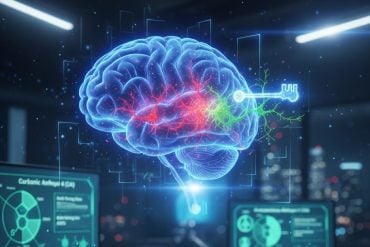Summary: New research shows that varied cognitive training, rather than repetitive tasks, helps older adults improve working memory.
Participants who engaged in multiple types of memory exercises saw the greatest improvement compared to those who repeated the same task. This suggests that diverse practice promotes better long-term learning, even though it may take longer to see initial progress.
The findings offer insights into improving cognitive function in aging populations.
Key Facts:
- Varied cognitive training improves working memory in older adults.
- Participants who practiced diverse tasks showed the most significant improvements.
- This approach enhances learning through the principle of mutualism, where related skills support each other’s growth.
Source: Beckman Institute
When Ilber Manavbasi attempts a tricky piano riff, he rehearses more than the notes on the page.
“I practice in diverse conditions and contexts. I practice hungry, tired, angry and happy. I practice different songs at different speeds and sometimes with different pianos,” said Manavbasi, a graduate student researcher at the Beckman Institute for Advanced Science and Technology. “It’s the variety of practice that makes me a better performer.”
Variety may also make us better learners, according to recent research conducted by Manavbasi and his colleagues at the University of Illinois Urbana-Champaign.
The researchers observed that varied practice, not repetition, primed older adults to learn a new working memory task. Their findings, which appear in the journal Intelligence, propose diverse cognitive training as a promising whetstone for maintaining mental sharpness as we age.
“People often think that the best way to get better at something is to simply practice it over and over again, but robust skill learning is actually supported by variation in practice,” said lead investigator Elizabeth A. L. Stine-Morrow, a Beckman researcher and professor emerita of educational psychology at Illinois.
“While the importance of diversity in practice has been well established in the area of motor learning, our study demonstrated that this principle applies to the development of mental skills as well,” she said.
In their 1978 study, Kerr and Booth found that children who practiced tossing a beanbag at a target from a set distance were less likely to hit their marks than children who had practiced throwing from several different distances.
On a larger scale, researchers have observed varied preparation to beget high-level performance in athletics and academics alike.
“World-class athletes who specialize in one sport are more likely to have had early experience with multiple sports than their national-class counterparts, and Nobel laureates are more likely to have more early study and work experiences outside of their discipline compared to nationally acclaimed award winners,” Stine-Morrow said.
She wondered how this concept translates to cognitive training. If learning were a sport, does a diverse training regimen raise the level of play?
The researchers narrowed their focus to working memory, or the cognitive ability to hold one thing in mind while doing something else.
“We chose working memory because it is a core ability needed to engage with reality and construct knowledge,” Stine-Morrow said. “It underpins language comprehension, reasoning, problem-solving and many sorts of everyday cognition.”
Because working memory often declines with aging, Stine-Morrow and her colleagues recruited 90 Champaign-Urbana locals aged 60-87.
At the beginning and end of the study, researchers assessed the participants’ working memory by measuring each person’s reading span: their capacity to remember information while reading something unrelated.
The researchers asked participants to read and comprehend a series of logical and illogical sentences (e.g., “Headwear worn by royalty is called a crown,” or “An animal with orange and black stripes is a zebra”), each paired with a letter of the alphabet.
Participants who recalled the letters in the correct order generally have a stronger working memory, the researchers said.
Between the reading span assessments, participants completed four weeks of cognitive training. For the first two weeks, participants trained on one of four practice regimens: the reading span task itself, a new working memory activity, multiple working memory activities and a control task unrelated to working memory. For the latter two weeks, all participants practiced a variation of the reading span task.
The participants who practiced with multiple working memory activities showed the most improvement on the reading span assessment from beginning to end, outperforming those who had rehearsed the reading span task for all four weeks.
Though ultimately the most improved, the mixed practice group was not immediately outperforming the others, the researchers noticed.
“They needed to work for it,” Stine-Morrow said. “Mixed practice did not directly lead to better performance; it led to better learning. That group was the slowest to improve on the reading span task, but they ultimately reached the highest peak.”
One reason that varied practice may promote skill development is because of the principle of mutualism, or “mutual growth among closely related abilities,” Stine-Morrow said.
These results provide early evidence for the concept of mutualism and show promise for improving working memory later in life.
“With this study, we have demonstrated the broad principle of mutualism through the small lens of how it applies to working memory,” Stine-Morrow said. “If you scale up this principle and combine it with different kinds of skills, that could demonstrate broader effects.”
Because of limitations caused by the COVID-19 pandemic, participants used their home computers and iPads provided by the research team to complete all portions of the study remotely.
“We are grateful to the folks in the Chambana community who support our research, especially in this case, where they had to fit these activities into their lives over the course of four weeks. Most people thought the activities were challenging, but fun, and treated them as a game they wanted to win,” Stine-Morrow said.
Funding: Research was supported by the National Institute on Aging of the National Institutes of Health under award number R56 AG058798. The content is solely the responsibility of the authors and does not necessarily represent the official views of the National Institutes of Health.
Stine-Morrow is also a research scientist and professor emerita in the Neuroscience Program at Illinois.
Dan Morrow, a Beckman researcher and professor emeritus in educational psychology at Illinois, and former Beckman researcher Aron Barbey are coauthors on this research.
About this memory and learning research news
Author: Jenna Kurtzweil
Source: Beckman Institute
Contact: Jenna Kurtzweil – Beckman Institute
Image: The image is credited to Neuroscience News
Original Research: Open access.
“Looking for transfer in all the wrong places: How intellectual abilities can be enhanced through diverse experience among older adults” by Elizabeth A. L. Stine-Morrow et al. Intelligence
Abstract
Looking for transfer in all the wrong places: How intellectual abilities can be enhanced through diverse experience among older adults
Research with cognitive training for older adults has largely shown that benefits are confined to the skills that are directly practiced with little or no generalization (or “transfer”) to other skills.
However, investigations typically rely on pre-post designs in which the effects of training on non-practiced skills can only be revealed in the initial encounter with the novel task after training.
The principle of mutualism suggests that growth in one cognitive skill may potentiate plasticity in related skills, such that transfer may only emerge with practice on the novel skill. We introduce a successive enrichment paradigm in which learning on a target skill (here, working memory (WM)) is examined as a function of earlier training experiences.
Older adults were randomly assigned to one of four groups who trained on different combinations of tasks before training on a verbal WM task. Practice with any combination of WM tasks accelerated learning of the target task relative to a verbal decision speed control.
Furthermore, those who first practiced multiple WM span tasks that were different from the target task showed larger pre- to posttest gain on the target WM task relative to those with prior exposure to only one different WM task or even the exact same WM task as the target. However, these effects only emerged with practice on the novel task.
These data provide support for the mutualism principle — a conceptualization of transfer that can explain the emergence of the positive manifold of cognitive abilities, and offers promise for new pathways to promote late-life cognitive health.







